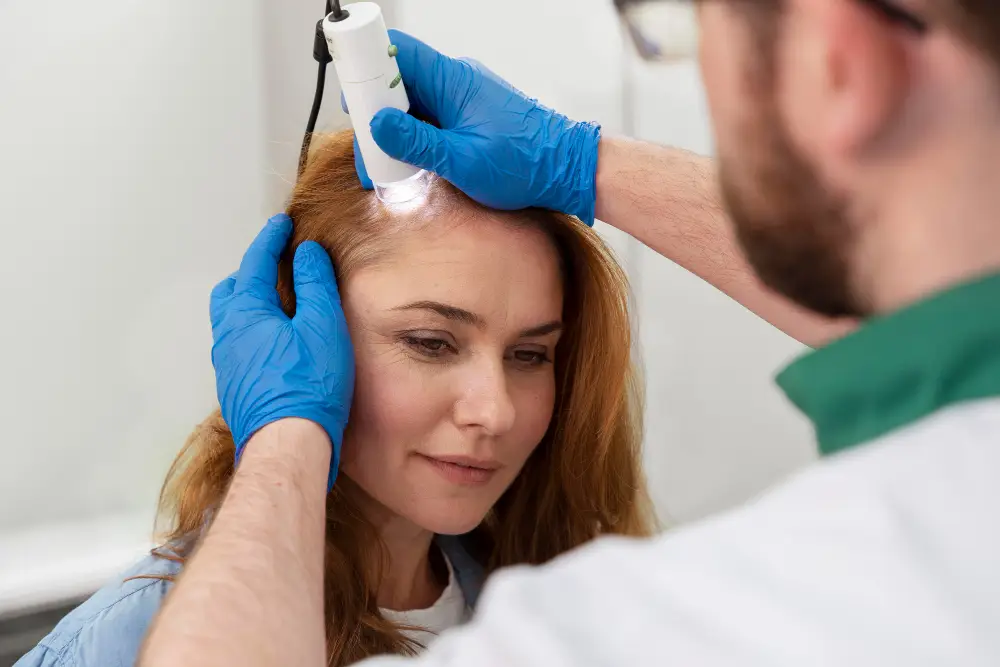
Understanding Stem Cell Transplant Options for Breast Cancer: A Patient’s Guide
Key Takeaways for Your Journey
- Stem cell transplants, particularly hematopoietic stem cell transplantation (HSCT), have a recognized role in specific breast cancer treatment protocols, primarily supporting high-dose chemotherapy for aggressive or recurrent cases.
- Research into cancer stem cells is an active area of study, exploring new therapeutic strategies beyond traditional approaches.
- Choosing a treatment pathway for breast cancer, especially one involving advanced therapies, requires comprehensive information and understanding of both established practices and investigational avenues.
- Colombia offers a robust healthcare infrastructure with internationally recognized standards, providing an accessible pathway for high-quality medical care.
- The team at Regencord in Pereira, Colombia, emphasizes a holistic, patient-centered approach, supporting you through every step of your medical journey, from logistical planning to post-treatment care.
Table of Contents
- Introduction: Navigating Complex Decisions in Breast Cancer Care
- The Stakes: Critical Implications of Breast Cancer and Advanced Therapies
- The Conventional Approach to Breast Cancer Treatment in Colombia
- The Pereira, Colombia Advantage: A Holistic Approach to Care
- The Regencord Clarity Pathway Planner: Your Resource for Informed Decisions
- Our Regenerative Philosophy and Approach
- Overcoming Common Hesitations: Why Seeking Clarity is a Strategic Advantage
- Glossary of Key Terms
- Frequently Asked Questions (FAQs)
- Your Next Step: Discovering Your Pathway to Clarity
- Disclaimer
Introduction: Navigating Complex Decisions in Breast Cancer Care
Facing a breast cancer diagnosis, especially when considering advanced treatment options like stem cell transplants, can feel like standing at the crossroads of hope and uncertainty. The journey is often emotionally intense, marked by a deluge of medical information, personal anxieties, and critical decisions that can profoundly impact your future. At Regencord in Pereira, Colombia, we understand this profound challenge.
This guide is designed to be a clear, ethical, and empowering resource. Our aim is to demystify the conversation around stem cell transplants for breast cancer, providing you with thoroughly researched, source-verified information. We believe that true patient empowerment comes from clarity, not confusion. As a lead medical communicator with the Regencord team, my goal is to walk you through the landscape of these therapies, highlight the unique advantages of seeking care in Pereira, Colombia, and equip you with the knowledge to make confident, informed choices about your health.
Our experience has shown us that many patients navigating complex conditions like advanced breast cancer often report feeling lost in a labyrinth of complex medical information and fragmented care pathways. This guide seeks to bridge that gap, offering a transparent view of the possibilities and the comprehensive support available. We’ll discuss the established science, address common concerns, and show you how a patient-centric journey in Pereira can offer a valuable pathway forward.
The Stakes: Critical Implications of Breast Cancer and Advanced Therapies

Breast cancer remains a significant global health concern. According to the World Health Organization (WHO), it is the most common cancer among women, affecting millions worldwide. When breast cancer progresses to an advanced or metastatic stage, treatment decisions become even more critical, focusing on managing the disease, improving quality of life, and extending survival.
Understanding Stem Cell Transplants in Breast Cancer Treatment
The term “stem cell transplant” can evoke a range of interpretations. For breast cancer, the primary established role of stem cells has historically been within hematopoietic stem cell transplantation (HSCT). This procedure is typically used in conjunction with high-dose chemotherapy. As highlighted by the U.S. National Institutes of Health (NIH), high-dose chemotherapy aims to destroy cancer cells, but it also damages the bone marrow, which produces blood cells. HSCT then replenishes the patient’s bone marrow with healthy blood-forming stem cells, allowing for recovery from the intensive chemotherapy and reducing its life-threatening side effects.
HSCT for breast cancer is not a standalone treatment for the tumor itself, but rather a supportive therapy that enables the use of more aggressive chemotherapy regimens for certain advanced or aggressive forms of breast cancer. It has been investigated for metastatic breast cancer in specific contexts, and current clinical guidelines inform its application based on patient characteristics and disease stage. More information on clinical trials can be found on platforms like ClinicalTrials.gov.
Exploring Cancer Stem Cells and Future Directions
Beyond HSCT, there’s a distinct and dynamic field of research focusing on cancer stem cells. These are a small subpopulation of cancer cells believed to be responsible for tumor initiation, growth, metastasis, and resistance to conventional therapies. Studies published in PubMed-indexed peer-reviewed journals continually explore how targeting these cancer stem cells could offer novel therapeutic strategies. This research is highly promising, though it represents investigational pathways rather than established clinical practice for most breast cancer types today.
It’s important for patients to understand the difference between these applications: the supportive role of HSCT and the experimental nature of therapies directly targeting cancer stem cells. Our discussions at Regencord are always grounded in the latest verifiable scientific evidence, ensuring transparency about what is established versus what is still under investigation.
The Conventional Approach to Breast Cancer Treatment in Colombia

Colombia’s healthcare system has seen significant advancements, boasting modern facilities and highly trained medical professionals. The Colombian Ministry of Health and INVIMA (Colombia’s national regulatory agency) play crucial roles in overseeing medical standards and ensuring patient safety across the nation. For breast cancer, conventional treatment pathways in Colombia generally align with international standards, incorporating surgery, radiation therapy, chemotherapy, hormone therapy, and targeted therapy, based on the stage and characteristics of the cancer.
Access to advanced therapies like hematopoietic stem cell transplantation (HSCT) for breast cancer exists within Colombia’s specialized oncology centers. These procedures follow established protocols, often for cases where high-dose chemotherapy is deemed necessary. Patients seeking such treatments in Colombia can expect care within a regulated environment, with many institutions holding national accreditations that signify adherence to quality benchmarks.
However, even within a robust system, the patient experience can vary. Factors such as the integration of supportive care, the ease of navigating complex medical processes, and the holistic support for international patients are areas where institutions can differentiate themselves. While the fundamental clinical treatments are available, the focus on a truly patient-centered, comprehensive journey, especially for those traveling from abroad, often presents an opportunity for enhanced care.
The Pereira, Colombia Advantage: A Holistic Approach to Care

For many patients considering advanced breast cancer treatment, the decision extends beyond the purely clinical. It encompasses the entire journey: the environment, the support system, and the overall value of the experience. The team at Regencord in Pereira, Colombia, offers a distinct advantage built on these crucial elements.
Advanced Infrastructure and Dedicated Care
Pereira, as part of Colombia’s thriving healthcare landscape, benefits from modern medical facilities equipped with advanced diagnostic and treatment technologies. Regencord operates within this high-standard environment, focusing on patient safety and delivering care that meets stringent protocols. Our approach is not just about the medical procedure; it’s about crafting a continuum of care that feels supportive and secure.
A Seamless Patient Journey, Designed for You
We’ve observed that a deeply integrated patient advocacy model, from initial inquiry through post-treatment support, is not just a convenience but a critical factor in mitigating anxiety and ensuring adherence to the treatment plan, particularly for those navigating care internationally. Our dedicated patient advocacy team acts as your single point of contact, streamlining every aspect of your journey:
- Personalized Case Review: Understanding your specific diagnosis and treatment history to determine potential pathways.
- Logistical Coordination: Assistance with travel arrangements, comfortable accommodation, local transportation, and visa guidance.
- Communication Facilitation: Ensuring clear, consistent communication between you, your medical team, and your family, bridging any language or cultural gaps.
- Continuous Support: On-the-ground assistance and advocacy throughout your stay, ensuring you feel cared for and never alone.
The Healing Environment of Pereira
Beyond the clinical, we’ve observed that the healing environment significantly impacts patient well-being. Pereira, nestled in Colombia’s picturesque coffee region, provides a unique restorative backdrop. Its mild climate, lush natural surroundings, and a cultural emphasis on warmth and hospitality create an atmosphere conducive to both physical and emotional recuperation. This holistic setting, often more accessible financially than comparable options in Western nations, provides a critical, often overlooked, layer of support that complements clinical excellence.
This comprehensive approach transforms the perception of a complex process into a manageable, supported pathway, emphasizing the role of a patient advocacy team and allowing you to focus on your health with peace of mind.
Introducing: The Regencord Clarity Pathway Planner
Navigating advanced medical decisions requires more than just information; it demands a structured approach to understanding your options and preparing for your journey. To assist you, the team at Regencord has developed The Regencord Clarity Pathway Planner.
This branded patient resource tool is designed to help you:
- Assess Your Needs: A guided checklist to help you articulate your medical history, treatment goals, and personal concerns.
- Understand Your Options: A framework for evaluating different treatment pathways, including those related to stem cell transplants for breast cancer, based on evidence and your specific condition.
- Prepare for Your Journey: Practical steps for considering international medical care, from initial inquiry to travel logistics and cultural considerations.
- Ask the Right Questions: A comprehensive list of questions to discuss with medical communicators and your potential care team.
The Clarity Pathway Planner is an invaluable asset for anyone seeking comprehensive understanding and structured preparation. It reflects our commitment to patient empowerment through education and detailed support.
Our Regenerative Philosophy and Approach

At Regencord in Pereira, Colombia, our philosophy is deeply rooted in regenerative principles, extending beyond specific cell therapies to encompass a comprehensive approach to patient wellness. While the term “regenerative medicine” often brings to mind specific stem cell applications, for us, it signifies a commitment to supporting the body’s natural healing capabilities and enhancing overall vitality.
For breast cancer care, this means:
- Integrated Support: We view treatment as part of a larger continuum that includes pre-treatment preparation, during-treatment support, and post-treatment recovery and wellness.
- Holistic Environment: Recognizing that healing is multifaceted, we leverage the natural beauty and tranquil environment of Pereira, Colombia, alongside compassionate care, to foster a conducive atmosphere for recuperation.
- Evidence-Based Discussions: All pathways discussed are grounded in scientific literature, often highlighted by the NIH and found in PubMed-indexed journals. We believe in transparency about the evidence for established treatments and the investigational nature of emerging therapies.
- Patient Empowerment: Our aim is to empower you with knowledge and support, enabling you to make informed decisions and actively participate in your health journey.
Our approach is educational, focused on what pathways might be available through the medical team, and emphasizes the importance of a confidential case review to tailor discussions to your unique situation. We do not make unverified clinical superiority claims or guarantee outcomes, but rather focus on providing a structured, ethical, and supportive environment for advanced care.
Overcoming Common Hesitations: Why Seeking Clarity is a Strategic Advantage
It is natural to have questions and hesitations when contemplating advanced medical treatments, especially for a condition as serious as breast cancer, and particularly when considering international travel for care. We address these common concerns head-on to build trust and provide clarity.
“Is stem cell transplant for breast cancer truly a recognized or effective treatment?”
While research into stem cell applications is dynamic, it’s crucial to understand the established and emerging roles. Hematopoietic stem cell transplantation (HSCT) has a long-standing, evidence-based role in supporting high-dose chemotherapy for certain aggressive breast cancers. Furthermore, ongoing research, often highlighted by the NIH and published in PubMed-indexed journals, explores the complex biology of cancer stem cells and novel therapeutic avenues. We focus on providing education on these distinctions, grounding our discussions in verifiable scientific evidence and transparently outlining current understanding and investigational pathways.
“Is receiving advanced medical care like this in Colombia safe and legitimate?”
Colombia has made significant strides in healthcare quality, with many facilities meeting international accreditation standards. The Colombian Ministry of Health and INVIMA rigorously oversee medical practices and product safety, ensuring a robust regulatory framework. Regencord operates within this regulated environment, adhering to stringent protocols. Our approach prioritizes transparency about these standards, allowing patients to make informed decisions based on verifiable facts about the country’s healthcare infrastructure and professional credentials.
“The logistics of international medical travel for a serious condition seem overwhelming.”
We understand that the logistical complexities can add to an already stressful situation. Our dedicated patient advocacy team acts as your single point of contact, streamlining every aspect of your journey—from initial case review and travel planning to accommodation and on-the-ground support. We transform this perceived complexity into a guided, manageable pathway, allowing you to focus on your health with the assurance that all practical details are expertly managed.
“How can I afford this, and will it genuinely offer a better option?”
The value proposition of seeking care in Pereira, Colombia, is not about ‘cheap’ care, but about accessing high-quality, comprehensive medical services and advanced therapies at a significantly more accessible cost structure compared to many Western countries. This enables a more holistic and less financially stressful patient journey, often including longer recovery stays or integrated wellness components that might be prohibitive elsewhere. Our focus is on transparent pricing and providing exceptional value without any compromise on clinical standards or patient safety.
Glossary of Key Terms
- Hematopoietic Stem Cell Transplantation (HSCT): A procedure used to restore the body’s ability to make blood cells after high-dose cancer treatment.
- Metastatic Breast Cancer: Breast cancer that has spread to other parts of the body beyond the breast and nearby lymph nodes.
- Cancer Stem Cells: A subpopulation of cancer cells believed to have self-renewal properties and the ability to drive tumor growth and recurrence.
- Graft-versus-Tumor Effect: A beneficial immune response that can occur after an allogeneic (donor) stem cell transplant, where the donor’s immune cells recognize and kill remaining cancer cells.
- INVIMA: Instituto Nacional de Vigilancia de Medicamentos y Alimentos, Colombia’s national regulatory agency for medicines, food, and medical devices.
- Patient Advocacy: The act of supporting and promoting the rights and needs of a patient, especially within the healthcare system.
Frequently Asked Questions (FAQs)
What types of breast cancer can benefit from stem cell transplant?
Hematopoietic stem cell transplantation (HSCT) is typically considered for certain aggressive or recurrent breast cancers, often in conjunction with high-dose chemotherapy. It is not a universal treatment for all breast cancers. The decision is highly individualized and depends on factors like cancer type, stage, and previous treatments, as outlined by guidelines from sources like the NIH.
How does Regencord ensure the quality and safety of stem cell treatments?
At Regencord, we adhere to rigorous protocols established within Colombia’s regulated healthcare environment. This includes working with facilities that meet national accreditation standards, ensuring strict oversight by the Colombian Ministry of Health and INVIMA, and utilizing thoroughly vetted medical teams. Our focus is on providing care that aligns with international safety and quality benchmarks, always in an ethical and transparent manner.
What is the typical timeline for an international patient seeking care at Regencord?
The timeline varies significantly based on individual medical needs, the complexity of the treatment, and travel logistics. Generally, it begins with a confidential case review (a few days to a week), followed by detailed planning (1-3 weeks), and then the treatment phase itself, which can range from several weeks to months, including recovery. Our patient advocacy team provides a personalized timeline during your initial consultation.
Are there options for family members to accompany the patient?
Absolutely. We recognize the vital role of family support in a patient’s healing journey. Our patient advocacy team assists with arrangements for accompanying family members, including accommodation options, local transportation, and guidance on activities in Pereira to ensure a comfortable and supportive environment for everyone involved.
How do I get my medical records reviewed by the Regencord team?
The first step is to contact us for a confidential case review. Our team will guide you through the secure process of submitting your relevant medical records, including diagnostic reports, previous treatment summaries, and imaging studies. This allows our medical communicators to conduct an initial assessment and facilitate a review by the appropriate medical professionals.
Discover if you are a candidate for the advanced regenerative medicine pathways available through the team at Regencord in Pereira, Colombia.



